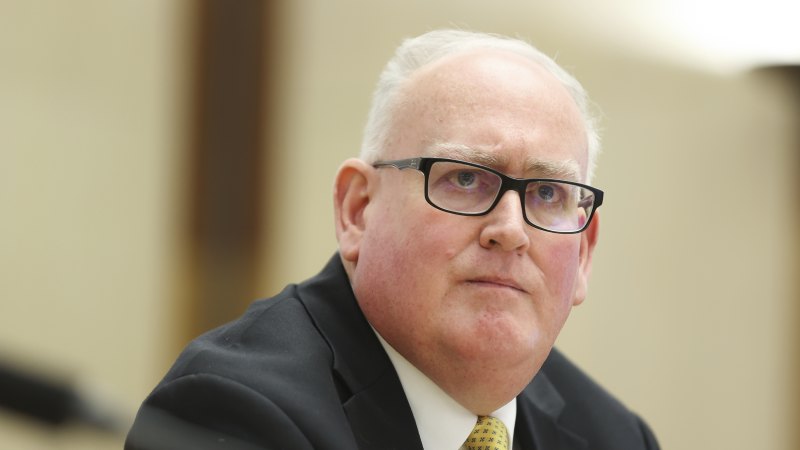‘Nonsense’: Liberal veteran skewers No campaign’s demand for more Voice details

Save articles for later
Add articles to your saved list and come back to them any time.
A Liberal Party elder has taken aim at “bunkum” pushed by the No campaign about the Indigenous Voice to parliament, including its pejorative description of a “Canberra voice” and its demands for more details on how the advisory body would operate.
Tony Nutt, a former federal director of the Liberals and chief-of-staff to John Howard, said the pre-federation inhabitants of Australia’s colonies adopted an entire constitution without knowing how parliament would eventually interpret its elements.
Liberal Party veteran Tony Nutt, who is also on the board of Australia Post and Australians for Indigenous Constitutional Recognition.Credit: Alex Ellinghausen
“They did not say, ‘I’m not voting for this constitution until I see a copy of the army and navy act’. They did not say, ‘I want to know the detail of the post and telegraph legislation’,” Nutt told a community forum in Vaucluse on Tuesday night.
“It might be that I have a deep concern about the colour on the button of the Victorian military establishment artillery unit. They didn’t go into all of that because they knew … if you agreed with the constitution, you adopted it. That sets the framework and the principles. Then the parliament breathes life into the institutions because that’s what the parliament does.
“So for all the nonsense you read at present, if they could do it 130 years ago minus digital media, TV, on the spot interviews … if they could manage that, we could probably manage a minor amendment.”
Nutt joined the board of Australians for Indigenous Constitutional Recognition, the Yes campaign’s organising and fundraising vehicle, earlier this year. He was speaking on Tuesday night as part of a panel on the conservative case for Yes convened by Wentworth MP Allegra Spender at the Diamond Bay Bowling Club in Sydney’s east.
The Liberal stalwart acknowledged “we don’t know the exact nature of the body yet because parliament will decide it”, but pointed out the size of the House of Representatives changes according to redistributions executed by laws of parliament and the Electoral Commission.
Nutt said members of the Voice would be chosen by local Indigenous people, not the government. Nor would it be compulsorily constituted by academics – “obviously the new criminal bikie gang leaders of Australian politics”.
“They’ll go to Canberra,” he said. “The Canberra that actually exists, not the mythical Canberra [where] the roads are paved with gold and the public servants are all at lunch, and lunch goes from about 10.30 to about 16.30. But the actual Canberra where the actual work gets carried on.”
The Voice would have a small secretariat, he said, and its job was to provide advice, not raise or spend money.
“When people tell you all of this stuff, it’s all guff, it’s bunkum, it’s designed to give messages to people in the wider electorate to persuade them to vote No.”
He also rubbished suggestions the Voice would be dictating or influencing policy on matters such as foreign affairs.
“Do we really think that Penny [Wong] is going to be told what to do about Russia or China or America or whoever by people on the Voice?” he said.
Nutt said a Voice to parliament and the public service would help drag the bureaucracy away from its fondness for one-size-fits-all approach to problems, which did not necessarily work in every Aboriginal community.
“When you actually strip away the straw men and the scarecrows, and just have a little bit of a think about what the proposal is, what the words are, how it’s going to work, you do wonder at some of the arguments and some of the divisions put by others.”
Asked about Opposition Leader Peter Dutton’s role in prosecuting some of those arguments against the Voice, Nutt said he was not interested in commenting on personalities or political tactics.
Panellists at Tuesday night’s event were challenged by an audience member about why the Voice would differ from other branches of government such as the National Indigenous Australians Agency, which had failed to close the gap.
Liberal MP Julian Leeser, who resigned as a shadow Indigenous Affairs minister so that he could campaign for the Voice, said the NIAA was part of the problem.
“It’s the same old, same old public service that’s been doing the same things, not listening to people, for umpteen years,” he said.
Cut through the noise of federal politics with news, views and expert analysis from Jacqueline Maley. Subscribers can sign up to our weekly Inside Politics newsletter here.
Most Viewed in Politics
From our partners
Source: Read Full Article
